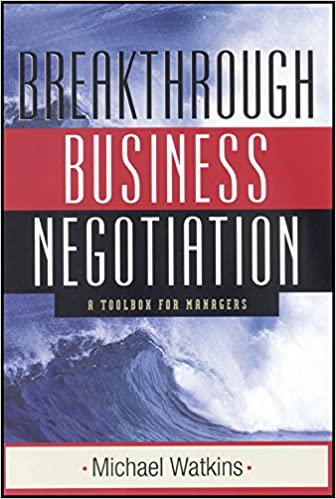“Breakthrough Business Negotiation” provides a comprehensive framework for negotiating in a business context, drawing on both theory and practical experience. The book covers topics such as negotiating tactics, the importance of preparation and information gathering, and how to build relationships with negotiating partners.
Build strong relationships
The most successful negotiations are built on strong relationships. Take the time to get to know your negotiating partner, understand their needs and interests, and work to build trust and rapport. The stronger the relationship, the more likely you are to find mutually beneficial solutions.
Use strategic concessions
Concessions are an important part of any negotiation. Use them strategically, making sure to trade something of lower value for something of higher value. Be willing to make concessions, but don’t give away too much too quickly.
Manage emotions
Emotions can run high in negotiations, which can lead to poor decision-making and impasse. Be aware of your own emotions and the emotions of the other party, and use emotional intelligence to manage the negotiation effectively. Stay calm, professional, and focused on the issues at hand.
Close the deal effectively
Closing the deal is the final stage of the negotiation. Make sure to review all details of the agreement, clarify any outstanding issues, and get the agreement in writing. Celebrate the successful negotiation, and work to maintain the strong relationship you have built with the other party.
Be willing to walk away
One of the most powerful negotiating tactics is to be willing to walk away from the table. If the other party is unwilling to meet your needs or is making unreasonable demands, don’t be afraid to end the negotiation and pursue your BATNA instead.
Define your objectives
Before entering any negotiation, it is important to define your objectives and goals. Think carefully about what you hope to achieve and what outcomes are acceptable. This will help you to stay focused and make strategic concessions when necessary.
Communicate effectively
Effective communication is crucial in any negotiation. Be clear and concise in your messaging, and listen carefully to the other party’s concerns and interests. Use active listening techniques, ask open-ended questions, and look for opportunities to build consensus and find common ground.
Focus on interests, not positions
Focusing on positions can lead to a stalemate in negotiations. Instead, focus on underlying interests and needs. By understanding the other party’s interests, you can work together to find creative solutions that meet both parties’ needs.
Understand your BATNA
Your Best Alternative To a Negotiated Agreement (BATNA) is the alternative option you have if the negotiation fails. Understanding your BATNA is crucial, as it gives you leverage and helps you to determine your bargaining power. Always have a strong BATNA in mind before entering any negotiation.
Prepare thoroughly
Preparation is key to successful negotiations. Take the time to gather information, research the other party, and develop a clear understanding of the issues at stake. This will help you to make informed decisions and avoid being blindsided by unexpected developments.


Member discussion: